Hyundai Kona VS Genesis GV80 – Specs, Efficiency & Price Comparison
Find out now which car fits your needs better!
The Hyundai Kona (SUV) is powered by a Petrol, Full Hybrid or Electric engine and comes with a Manuel or Automatic transmission. In comparison, the Genesis GV80 (SUV) features a Petrol or Diesel engine and a Automatic gearbox.
When it comes to boot capacity, the Hyundai Kona offers 466 L, while the Genesis GV80 provides 735 L – depending on what matters most to you. If you’re looking for more power, you’ll need to decide whether the 218 HP of the Hyundai Kona or the 304 HP of the Genesis GV80 suits your needs better.
There are also differences in efficiency: 14.60 kWh4.50 L vs 8.80 L. In terms of price, the Hyundai Kona starts at 23100 £, while the Genesis GV80 is available from 59400 £.
Compare all the key specs now and find out which model fits your lifestyle best!
Hyundai Kona
The Hyundai Kona blends a bold design with a versatile interior, making it a standout choice in the compact SUV market. Its crisp handling and responsive steering provide an engaging driving experience, whether in the city or on the open road. The vehicle also offers a range of features designed to enhance comfort and connectivity, ensuring a pleasurable journey for both driver and passengers.
details @ hyundai.news
@ hyundai.news
 @ hyundai.news
@ hyundai.news
 @ hyundai.news
@ hyundai.news
 @ hyundai.news
@ hyundai.news
Genesis GV80
The Genesis GV80 impresses with its refined design and luxurious interior, offering an opulent driving experience that stands out in the luxury SUV segment. It delivers exceptional comfort and advanced technology features that enhance both driver and passenger enjoyment. The GV80 combines style and performance seamlessly, making it a compelling choice for those seeking sophistication on the road.
details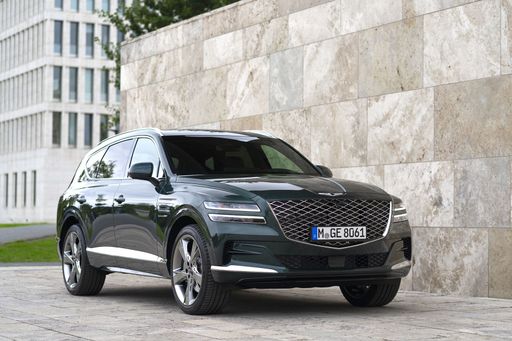 @ Genesis
@ Genesis
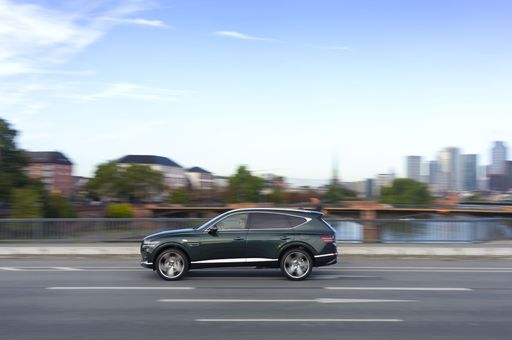 @ Genesis
@ Genesis
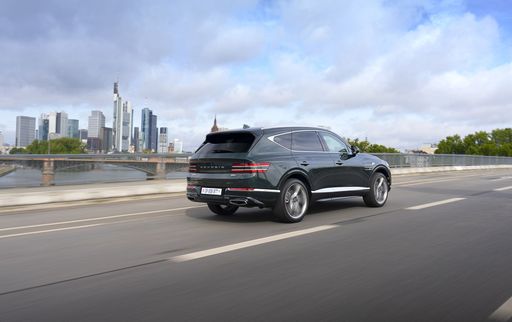 @ Genesis
@ Genesis
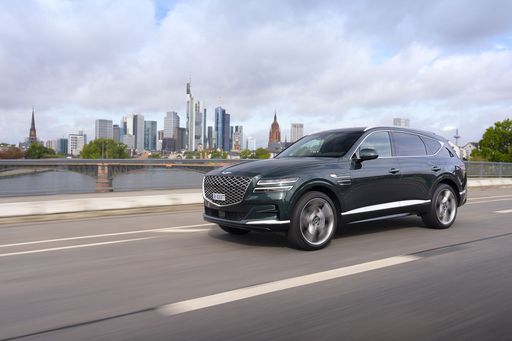 @ Genesis
@ Genesis
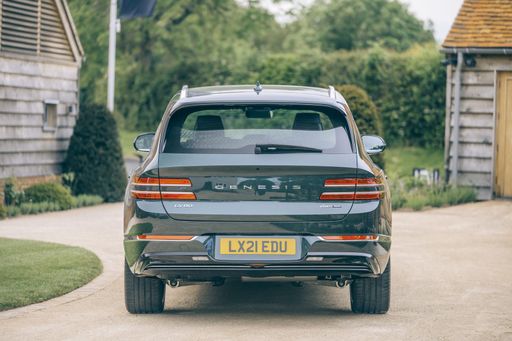 @ Genesis
@ Genesis
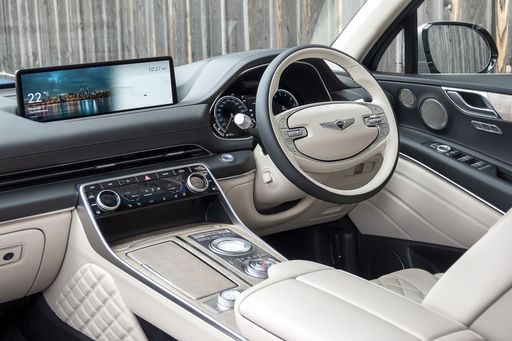 @ Genesis
@ Genesis

|

|
|
|
|
Costs and Consumption |
|
|---|---|
|
Price
23100 - 41600 £
|
Price
59400 - 75600 £
|
|
Consumption L/100km
4.5 - 6.9 L
|
Consumption L/100km
8.8 - 10.8 L
|
|
Consumption kWh/100km
14.6 - 16.8 kWh
|
Consumption kWh/100km
-
|
|
Electric Range
377 - 514 km
|
Electric Range
-
|
|
Battery Capacity
1.3 - 65.4 kWh
|
Battery Capacity
-
|
|
co2
0 - 157 g/km
|
co2
231 - 241 g/km
|
|
Fuel tank capacity
38 - 47 L
|
Fuel tank capacity
80 L
|
Dimensions and Body |
|
|---|---|
|
Body Type
SUV
|
Body Type
SUV
|
|
Seats
5
|
Seats
5 - 7
|
|
Doors
5
|
Doors
5
|
|
Curb weight
1370 - 1773 kg
|
Curb weight
2155 - 2325 kg
|
|
Trunk capacity
466 L
|
Trunk capacity
727 - 735 L
|
|
Length
4350 - 4385 mm
|
Length
4945 mm
|
|
Width
1825 mm
|
Width
1975 mm
|
|
Height
1580 - 1585 mm
|
Height
1715 mm
|
|
Payload
420 - 490 kg
|
Payload
660 - 690 kg
|
Engine and Performance |
|
|---|---|
|
Engine Type
Petrol, Full Hybrid, Electric
|
Engine Type
Petrol, Diesel
|
|
Transmission
Manuel, Automatic
|
Transmission
Automatic
|
|
Transmission Detail
Schaltgetriebe, Automat. Schaltgetriebe (Doppelkupplung)
|
Transmission Detail
Automatikgetriebe
|
|
Drive Type
Front-Wheel Drive, All-Wheel Drive
|
Drive Type
All-Wheel Drive
|
|
Power HP
100 - 218 HP
|
Power HP
272 - 304 HP
|
|
Acceleration 0-100km/h
7.8 - 13.3 s
|
Acceleration 0-100km/h
6.90 s
|
|
Max Speed
162 - 208 km/h
|
Max Speed
230 - 237 km/h
|
|
Torque
200 - 265 Nm
|
Torque
422 - 588 Nm
|
|
Number of Cylinders
3 - 4
|
Number of Cylinders
4 - 6
|
|
Power kW
74 - 160 kW
|
Power kW
200 - 224 kW
|
|
Engine capacity
998 - 1598 cm3
|
Engine capacity
2497 - 2996 cm3
|
General |
|
|---|---|
|
Model Year
2024
|
Model Year
2021 - 2022
|
|
CO2 Efficiency Class
D, C, E, F, A
|
CO2 Efficiency Class
G
|
|
Brand
Hyundai
|
Brand
Genesis
|
Hyundai Kona
The Hyundai Kona: A Comprehensive Overview
The Hyundai Kona has established itself as a standout in the compact SUV segment, blending innovation with performance and style. As the automotive world moves towards more sustainable and efficient options, the Kona offers a variety of powertrains, from traditional petrol engines to full hybrids and all-electric models.
Powertrain Options and Performance
The Hyundai Kona's powertrain choices cater to a wide range of preferences. For petrol enthusiasts, the Kona offers a 1.0L T-GDI engine, delivering 100 PS, and a more robust 1.6L T-GDI variant with up to 170 PS. Those looking for efficiency without sacrificing power can consider the full hybrid model, offering 129 PS and an impressive consumption of 4.5 L/100km.
For a greener option, the all-electric Kona provides a compelling case. With battery capacities of up to 65.4 kWh, the electric Kona offers power outputs of 156 to 218 PS, and efficiencies as low as 14.6 kWh/100km, enabling an electric range of up to 513 km.
Technical Specifications and Innovations
Built on a robust platform, the Kona delivers versatility and reliability. With a choice between manual or dual-clutch automatic gearboxes, along with options for front-wheel or all-wheel drive, the Kona ensures a tailored driving experience. The handling is enhanced by the car's lightweight construction, balancing a 1370 to 1773 kg curb weight with dynamic performance.
The Kona's design doesn't compromise cargo space for style; it offers a generous 466 L boot capacity. With a relatively compact body, measuring 4350 to 4385 mm in length, the Kona easily navigates urban environments while still commanding a strong road presence with its 1825 mm width.
Efficiency and Eco-Friendliness
Hyundai is committed to reducing emissions, as evidenced by the Kona's CO2 efficiency ratings, which range from class A for electric models to class D for some higher-performance petrol variants. The focus on reducing environmental impact without sacrificing driving pleasure is notable throughout the Kona range.
Costing and Value
The Hyundai Kona offers commendable value for money. Pricing starts at €26,400 and reaches up to €50,690, depending on the chosen configuration. The monthly running costs range from €956 to €1090, with a cost per kilometre of 38.3 to 43.6 cents, making it a competitive option in its class.
Conclusion: Modern, Efficient, and Versatile
The Hyundai Kona stands as a testament to Hyundai's commitment to innovation, efficiency, and practicality. Whether you are inclined towards a traditional combustion engine, a hybrid for a balance of power and efficiency, or a full electric model for maximum eco-friendliness, the Kona provides a tailored solution for each unique driver preference.
Genesis GV80
A New Era of Luxury: The Genesis GV80
In the world of luxury SUVs, the Genesis GV80 stands out as a beacon of innovation and style. With its sleek design, powerful engine options, and cutting-edge technology, the GV80 represents the pinnacle of automotive engineering. This article delves into the technical specifications and innovations that make the GV80 a remarkable vehicle in today's market.
Power and Performance
Under the hood, the Genesis GV80 offers a choice between robust petrol and efficient diesel engines, each designed to meet the demands of discerning drivers. The petrol variant is powered by a 2.5-liter engine, delivering a potent 304 horsepower, while the diesel option boasts a 3.0-liter engine with 272 horsepower. Both models come equipped with an advanced all-wheel-drive system and an automatic transmission, ensuring smooth and responsive handling in varied driving conditions.
The GV80's performance is further underscored by its impressive acceleration. It can sprint from 0 to 100 km/h in just 6.9 seconds, matching the expectations of luxury SUV enthusiasts. Furthermore, the petrol model offers a consumption rate of 10.8 L/100km, whereas the diesel is even more economical, at just 8.8 L/100km.
Design and Dimensions
Beyond performance, the Genesis GV80 is designed with a meticulous attention to detail. Its body type, a spacious SUV, offers versatility and comfort, accommodating up to seven passengers with its varying seating configurations. The vehicle's exterior dimensions – 4945 mm in length, 1975 mm in width, and 1715 mm in height – provide a commanding road presence while maintaining an elegant silhouette.
Inside, the GV80's luxury trim features high-end materials and a sophisticated layout, offering an unparalleled sense of comfort and refinement. The trunk capacity of 727 to 735 liters allows for ample storage, making it ideal for both everyday use and long-distance travel.
Innovative Technology
Genesis has ensured that the GV80 is equipped with the latest technological advancements. The SUV features an array of driver-assistance systems, including adaptive cruise control, lane-keeping assist, and a comprehensive suite of safety features such as automatic emergency braking. These technologies are designed to enhance the driving experience while ensuring maximum safety for all occupants.
Environmental Responsibility
The GV80 is also committed to reducing its environmental footprint. With CO2 emissions rated at 231 to 241 g/km, it aims to balance performance with efficiency. The diesel variant, in particular, offers greater fuel efficiency, contributing to a reduced environmental impact.
Conclusion
The Genesis GV80 embodies the perfect fusion of luxury, power, and innovation. Its range of features and superior design make it a strong contender in the competitive luxury SUV market. Whether it's the daily commute or a cross-country adventure, the GV80 promises an exceptional driving experience, underscoring Genesis' commitment to redefining luxury in the automotive world.
The prices and data displayed are estimates based on German list prices and may vary by country. This information is not legally binding.
